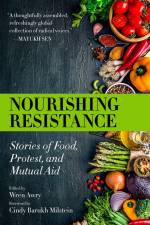av Wren Awry
265,-
From the cooks who have quietly fed rebels and revolutionaries to the collective kitchens set up after hurricanes and floods, food has long played a crucial role in resistance, protest, and mutual aid. Until very recently, food-based worksteadfast and not particularly flashyslipped under the radar or was centered on celebrity chefs and well-funded nonprofits. Adding to a growing constellation of conversations that push against this narrative, Nourishing Resistance centers the role of everyday people in acts of culinary solidarity.Twenty-three contributorscooks, farmers, writers, organizers, academics, and dreamerswrite on queer potlucks, BIPOC-centered farms and gardens, rebel ancestors, disability justice, indigenous food sovereignty, and the fight against toxic diet culture, among many other topics. They recount bowls of biryani at a Delhi protest, fricas de conejo on a Puerto Rican farm, pay-as-you-want dishes in a collectively-run Hong Kong restaurant, and lemon cake cooked in a New Jersey disaster relief kitchen. They chronicle the communal kitchens and food distribution programs that emerged in Buenos Aires and New York City in the wake of COVID-19, which caused surging food insecurity worldwide. They look to the past, revealing how Bella Ciao was composed by striking women rice workers, and the future, speculating on postcapitalist worlds that include both high-tech collective farms and herbs gathered beside highways.Through essays, articles, poems, and stories, Nourishing Resistance argues that food is a central, intrinsic part of global struggles for autonomy and collective liberation.

